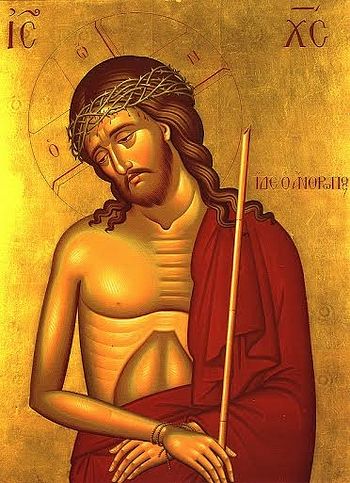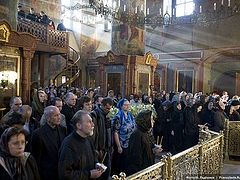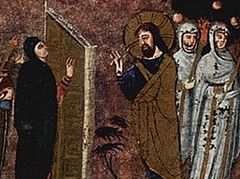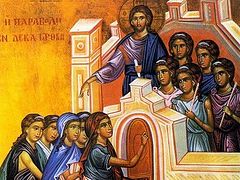Homily delivered at the Bridegroom Matins Service at the Chapel of Saint Sergius of Radonezh April 13, 2014.
In the Name of the Father, and of the Son, and of the Holy Spirit.
In the Gospel reading we have just heard, our Lord and Savior Jesus Christ offers 3 parables for our edification.
The first parable speaks to us of the Fig tree which had leaves but was barren of any fruit. With this image, the Lord is rebuking those around Him who adorned themselves with the greenery of external piety but were devoid of inner virtue, as well as those who throughout history, had become slaves to the law and had not borne the fruit of the spirit.
In the second parable, we hear of the Man who sent his two sons to work in his vineyard. The one said “I will go to work” but did not go; the other said: “I will not go to work” and yet did go. With these words, the Lord is admonishing all those who might have felt themselves entitled to receive the Kingdom without the needed labor and effort of offering repentance.
The third parable speaks of a Householder who planted a vineyard and went away, leaving it in the care of husbandmen. Later, that Householder sent servants to collect the fruit of his vineyard, but the husbandmen killed not only the servants but even the son of the Householder. This parable is offered as a warning to those who fail to offer fitting honor and worship to their own Creator and Lord.
On a historical level, Christ was offering these parables as rebukes to the people of His time and as warnings to the followers of the old covenant who were unwilling, or unable, to see that the Kingdom was upon them. On a spiritual level, Christ offers these parables to us, today, as a warning of the coming judgement which we all must face.
But beyond the historical and the spiritual levels, Christ offers these parables as doorways by which we might enter into the sacred reality of Holy Week, that is, to enter into the Glory of the Kingdom by sharing in the Passion of Christ.
By cursing the barren fig tree, the Lord is not simply revealing his Divine power, but encouraging us to persevere in faithful prayer, for He says, Whatsoever ye shall ask in prayer, believing, ye shall receive. And so we must, first of all, enter into this coming week with a prayerful heart and a pure mind. If we can do this, even in a small measure, we shall receive the grace of God in abundance.
By describing the actions of the two sons, the Lord reminds us that we have the freedom to decide whether we will go, or whether we will not go. But this freedom is not a simple choice, for even if we have chosen to follow one path, we have the freedom and the ability to change the way we go, even at the eleventh hour.
Perhaps we began the 40 days of Great Lent with zeal, with prayer and with fasting, but then we forgot, or got tired, or grew lazy. The Lord reminds us that, in spite of our human weakness, in spite of falling short of our own expectations, we can still renew our zeal, our prayer and our fasting now, even if we began without zeal or with uncertainty.
Finally, like the husbandman who does not receive the servants of the Householder, we know that we often ignore the call of the Lord, or even the call of our own conscience, to come to Church, to offer our prayers, to forgive our brother, to follow the commandments, or to love God.
In this way, we reject not only the servants of God, but God Himself. And yet, in our failures there is hope, because there is always repentance. If we feel the shame of our sins and our failures, then we have the hope that in the Lord there is forgiveness and love. And if we cling to that hope, that forgiveness and that love, then our hearts will be opened to receive the light of Christ, the light of the Resurrection, the Light of the Kingdom.
Today the hymns of the Church remind us that we are passing from one feast to another, from palms and branches to the solemn celebration of the Lord’s Passion. Today’s celebration of the Triumphant entrance of our Lord into Jerusalem, together with yesterday’s prefiguration of the universal resurrection through the miraculous raising of Lazarus from the dead, offer us a fitting doorway to pass from the struggles of Great Lent to the mystery of the Passion of Christ.
Whether we have made good progress or whether we have not even begun, all of us must humble ourselves and trust that our meager efforts have been acceptable to God. and learn from the example of the Master Himself, the One who suffers for us [to] heal our passions by His Passion; for willingly He undergoes in our human nature His life-giving sufferings, that we may be saved.
As the hymns of this Church remind us, this entire week is a feast, a feast that is filled with light. Even as Christ undergoes the Passion, to be questioned and beaten and to be nailed to the Cross, He radiates the Light of His Divinity and reminds us that there is no darkness that came overcome Him. And even as we make haste to follow Him on this path, we can partake of that same light by His Grace, as we reflect on the divine instructions that are offered to us in the beautiful and meaningful hymns of the Church and in the readings from Holy Scripture which have been chosen with great wisdom by the Church to be read during these days.
So may we be inspired and guided by this wisdom and reflect upon the words of today’s Gospel reading: By contemplating the barren fig tree, let us be humbled by our barrenness in virtue and be mindful of the judgement seat of Christ; by meditating on the actions of the two sons, let us remember that it is not enough to have good intentions, rather we must act upon those good intentions, even if we act at the eleventh hour. And in reflecting on the householder who sent his son to collect the fruit of his vineyard, let us remember Christ, for He Himself has now come to take us on His shoulders, to bring to perfection our feeble efforts and to lead to salvation,
In this, let us make our own the words of the hymns of the Church: Cleaving to the Lord as He makes haste to suffer all things, let us prepare ourselves for spitting, mockery and disgrace, that, remaining faithful to Him in His holy Passion, we may be glorified with Him, both now and forever, and unto the ages of ages. Amen.




